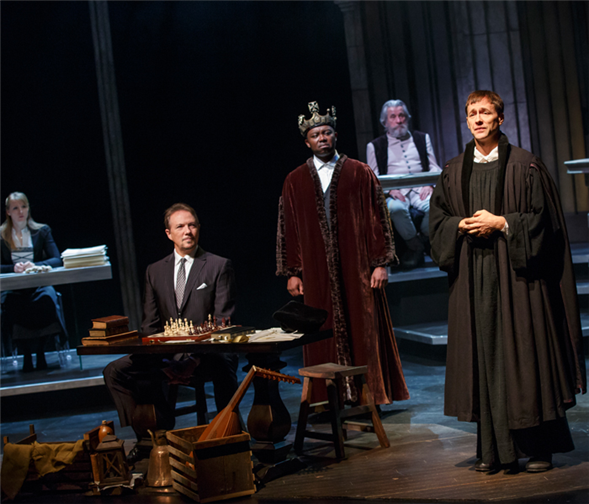Translate Page

A new play interrogates the religious giant's legacy
---
In Martin Luther on Trial, the iconic religious leader is prosecuted for the greatest sin of all – blasphemy against God.
"It's a fairly straightforward courtroom procedural play," says Michael Parva, who is directing the show for Fellowship for the Performing Arts. "That's terrific because we all love courtroom plays."
But as enticing as its structure may be, the play, which is at the Pearl Theatre's space through January 29, is hardly cut-and-dry. For one thing, the trial takes place in a fantastical afterlife. Saint Peter presides over the hearing, Martin Luther's wife Katie defends him, and the prosecutor is none other than Lucifer himself. Witnesses include Hitler, Sigmund Freud, St. Paul, Martin Luther King Jr., and Pope Francis.
The presence of all these historical figures allows the script, by Chris Cragen-Day and Max McLean, to probe not only Luther's actions, but also their seismic impact on humanity. That underlines FPA's mission to produce work with a Christian worldview that can engage a broad audience. It also invites patrons to serve as a type of jury, deciding for themselves what they make of Luther and his legacy.
And because Hitler is the first witness called to the stand, it's hard to ignore the darker echoes of Luther's work. "There are many historical claims that some of Hitler's most awful conceptions were generated by Martin Luther," Parva says. "But [in the play] Luther's wife defends him saying it's an absurd comparison."
The next witness is Martin Luther King Jr. "He supports the claim that Luther had no desire to upend and split the church in the way that the Devil has claimed," says Parva.
Particular attention is paid to Luther's ideas about Judaism. "He had a lot of issues, and he did say awful things about the 'Jewish Condition,'" Parva says. "Whether or not he was anti-Semitic comes up in the trial. It's not an easy part of his history. It's a dark stain in his life which the Devil tries to lean on."
Occasional flashbacks take us out of the courtroom, giving us a glimpse at the historical context of Luther's actions. "The flashbacks give us insight into his behavior," says Parva. "For a time Luther's hope was to unite the Jewish and Catholic religions, and when he wasn't successful he went into great despair and turned against the powers. He had big beef with the establishment. He had great disdain for the Pope and the papists, who oversaw the Catholic Church and advocated for the selling of indulgences, and he equated that disdain for rabbis. He believed everyone needed up make up their individual minds about their relationship with God and that they shouldn't be swayed by middle men."
So was Luther truly blasphemous? Should we condemn him for splitting the church in two and for his ugly, bigoted statements? Or should we celebrate his rebellious spirit, which advocated for faith and faith alone? Those questions will hang in the air long after this particular trial is over, leaving us to interrogate ourselves about what the answers should be.
---
TDF Members: At press time, discount tickets were available for 'Martin Luther on Trial.' Go here to browse our current offers.
Eliza Bent is a writer and performer based in Brooklyn.
Photos by Joan Marcus. Top photo: The cast of 'Martin Luther on Trial.'